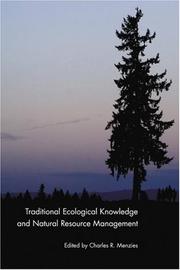| Listing 1 - 7 of 7 |
Sort by
|

ISBN: 1280550740 9786610550746 0803207352 9780803207356 0803232462 9780803232464 0803283199 9780803283190 9781280550744 6610550743 Year: 2006 Publisher: Lincoln University of Nebraska Press
Abstract | Keywords | Export | Availability | Bookmark
 Loading...
Loading...Choose an application
- Reference Manager
- EndNote
- RefWorks (Direct export to RefWorks)
A collection of essays on the ways Native communities have interacted with the environment. This work examines how traditional ecological knowledge (TEK) is taught and practised among Native communities. It focuses on the complex relationship between indigenous ecological practices and other ways of interacting with the environment.
Conservation of natural resources --- Traditional ecological knowledge --- Ethnoecology --- Indigenous ecological knowledge --- Indigenous environmental knowledge --- T.E.K. (Traditional ecological knowledge) --- TEK (Traditional ecological knowledge) --- Traditional environmental knowledge --- Ethnoscience --- Experiential learning --- Biopiracy --- Conservation of resources --- Natural resources --- Natural resources conservation --- Resources conservation, Natural --- Environmental protection --- Natural resources conservation areas --- Indigenous peoples --- Human ecology --- Conservation --- Ecology
Book
ISBN: 0803291701 9780803291706 9780803288089 0803288085 1496200519 9781496200518 Year: 2016 Publisher: Lincoln, NE
Abstract | Keywords | Export | Availability | Bookmark
 Loading...
Loading...Choose an application
- Reference Manager
- EndNote
- RefWorks (Direct export to RefWorks)
Tsimshian Indians --- Traditional fishing --- Chimmesyan Indians --- Indians of North America --- Fishing, Primitive --- Primitive fisheries --- Primitive fishing --- Traditional fisheries --- Fishing --- Small-scale fisheries --- Politics and government. --- History. --- Gitxaala
Book
ISBN: 1442605146 1442605138 Year: 2011 Publisher: Toronto, Ontario : University of Toronto Press,
Abstract | Keywords | Export | Availability | Bookmark
 Loading...
Loading...Choose an application
- Reference Manager
- EndNote
- RefWorks (Direct export to RefWorks)
"Small-scale, family fishing enterprises manage to persist despite a range of difficult economic and ecological changes and disruptions. Red Flags and Lace Coiffes is an ... ethnography that explores how and why family-based fishing enterprises continue in the face of what seem to be overwhelming odds. Using historical ethnography as a lens through which to understand how the fishers and their families of the Bigouden region in France have situated themselves over time, Charles R. Menzies argues that local identity plays an important role as global capitalist pressures force these fishing communities to reorganize or disappear entirely. Throughout, the book touches on key concepts such as identity, culture, globalization, kinship, work, the environment, and the economy."--Publisher's description.
Fishing villages --- Economic aspects --- Social aspects --- Bigouden (France) --- Social life and customs.
Book
ISBN: 9781442605138 1442605138 9781442605121 144260512X 1442605146 Year: 2011 Publisher: University of Toronto Press
Abstract | Keywords | Export | Availability | Bookmark
 Loading...
Loading...Choose an application
- Reference Manager
- EndNote
- RefWorks (Direct export to RefWorks)
Multi
ISBN: 9781442605138 Year: 2021 Publisher: Toronto, Ont. University of Toronto Press
Abstract | Keywords | Export | Availability | Bookmark
 Loading...
Loading...Choose an application
- Reference Manager
- EndNote
- RefWorks (Direct export to RefWorks)
Book

ISBN: 1845415256 1845415248 9781845415242 1845415221 184541523X Year: 2015 Publisher: Bristol, UK Blue Ridge Summit, PA
Abstract | Keywords | Export | Availability | Bookmark
 Loading...
Loading...Choose an application
- Reference Manager
- EndNote
- RefWorks (Direct export to RefWorks)
This book examines how the growth of tourism in locations that have historically been considered geographically remote plays a major role in the consolidation and transformation of often longstanding and powerful cultural imaginaries about ‘the edges of the world’. The contributors examine the attraction of the sublime, remoteness, continental border-points, and the dangers of the sea in Finisterre (or Fisterra) in Galicia (Spain); Finistère in Brittany (France); Land’s End, Cornwall (England); Lough Derg (Ireland); Nordkapp or North Cape (Norway); Cape Spear, Newfoundland (Canada); and Tierra del Fuego (Argentina). While those travelling to these locations can be seen to be conducting some form of religious or secular pilgrimage, those who live in them have long contended with the implications of economic and political marginalization within global political economies.
Culture and tourism. --- Pilgrims and pilgrimages. --- Historical geography. --- Geography, Historical --- Geography --- Pilgrimages and pilgrims --- Processions, Religious --- Travelers --- Voyages and travels --- Shrines --- Spiritual tourism --- Ethnotourism --- Tourism and culture --- Tourism --- Culture and tourism --- Pilgrims and pilgrimages --- Historical geography --- Borders. --- Coastal tourism. --- Continental border-points. --- Finisterres. --- Geographically remote locations. --- Land's ends. --- Secular pilgrimage. --- The attraction of the extreme. --- The sublime. --- Tourist imaginaries.
Digital

ISBN: 9781845415242 9781845415235 Year: 2015 Publisher: Bristol, UK;; Blue Ridge Summit, PA Channel View Publications
Abstract | Keywords | Export | Availability | Bookmark
 Loading...
Loading...Choose an application
- Reference Manager
- EndNote
- RefWorks (Direct export to RefWorks)
| Listing 1 - 7 of 7 |
Sort by
|

 Search
Search Feedback
Feedback About UniCat
About UniCat  Help
Help News
News